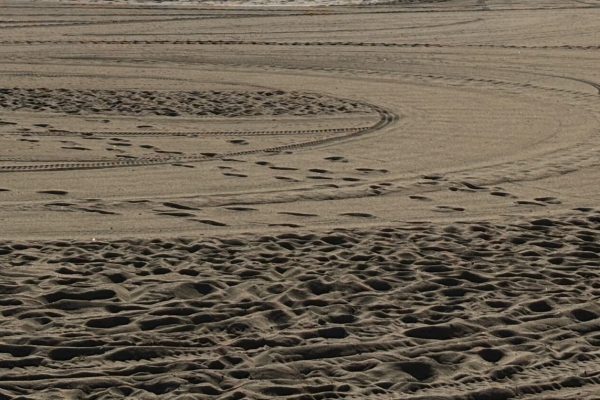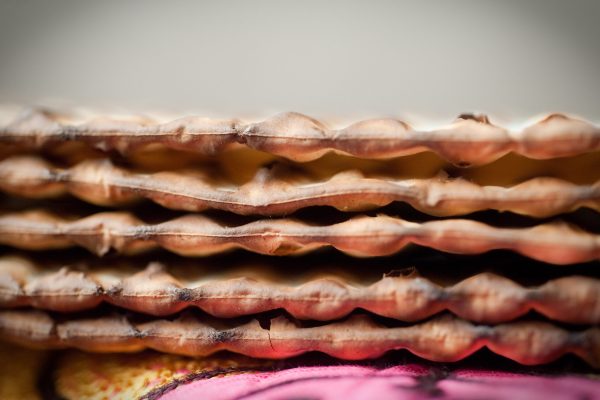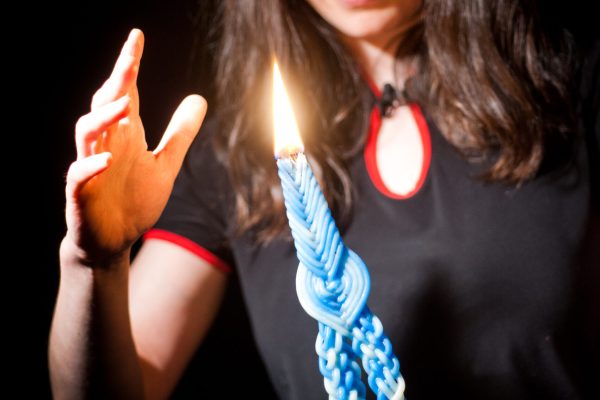My first Rosh Hodesh group experience was in Jerusalem in 1983-84. I was spending a year at Pardes, a co-ed yeshiva. It was a great experience, culminating in a Shabbaton which changed my life forever. The Shabbaton was the first time I had felt the safety and gentleness of “womenspace” combined with the learning and the challenges facing Jewish women–it felt like sacred time. I gained a sense of the power of women in community, and vowed to try and set something up in Toronto on my return from Israel.
Upon return, I called as many Jewish feminists as I could round up, and we met in a park. I was trying to transmit to them the powerful experience I had had, and they could sense I was excited about something, but they had no idea what this could mean. I persuaded them that we just had to try this and we began to meet.
This group, B’not Halevana, had a rocky start, and we argued for months over questions such as whether the group should be open or closed, and what should we really be doing. About nine months into the process, I again begged and pleaded for this group to come away for a retreat together. We went to a retreat center for the weekend, and magic happened. It was very powerful to have all that bonding time – the retreat solidified the group very fast instead of taking months. The participants had found their feminist “click”– that moment of revelation that something essential was happening to them as women.
That retreat bonded the group and gave it energy for five years. We continued to do weekend retreats twice a year. B’not Halevana is still meeting. It has served as the home for many wandering Jews, sending some to Israeli orthodox yeshivas at later stages of their journeys, and some to find their lesbian identities, some to rabbinical school, and all to better understanding of a Jewish feminist identity.
This group was the first one that I started but it has not been the last. Five years later I again found myself in Israel starting a Rosh Hodesh group. Since then I have catalyzed groups in Philadelphia and Tennessee and am now part of a group that has been meeting in some form for over ten years.
Celebrating Rosh Hodesh has been one of my main spiritual practices over the last ten years and I have seen all kinds of evenings, none ever the same. I would like to suggest the following outline for a Rosh Hodesh, or women’s gathering. It is a composite of a number of ceremonies.
- Have some sort of altar or centerpiece with a candle or candles symbolizing fire; incense, spices or aromatherapy oils symbolizing air; juice or tea, for water; chocolate always goes well for earth. Whether these things are used as parts of the ritual or as part of the celebration afterwards, their alchemy creates a mood for the event.
- Sing a song that will transform the energy and focus the group. There are lots of wonderful Jewish women’s songs by Debbie Freidman, Linda Hirshorn, Hanna Tiferet Siegel, Margot Stein Azen, Shefa Gold, and me.
- Do a check-in, allowing every woman to say a few words (limit them, as they can go on for hours) about her life or the theme for the evening.
- Do a ritual: teach something, make something, meditate on something that reflects your theme. A crafts project of some sort is good, as it allows people to get out of their head.
- Share what came up, discuss common reactions and pain that surfaces. Give special time to those who really need it; there is always someone each month who will need that extra attention.
- Sing some more.
- Close and say Hodesh Tov (have a good month)
- Set the next meeting time and place.
Some groups take turns: one month they study traditional Jewish texts, one month they study the Torah of their lives, one month they do ritual, one month they sing. It depends on the group.
Here are some tips for staying organized:
- Clear calendar dates as far in advance as possible, even if you have to have a business meeting to do it. The best time to plan is in the fall.
- Stay as close to Rosh Hodesh day as possible–the magical energy of the day will be with you.
- Have some kind of intense experience with each other. Even if it means a longer meeting over dinner, it will create bonding and intimacy that much faster.
- Have a phone tree.
- Make sure that there are at least one or two people who “nurture” the group, i.e. calling the strays to fill them in, making sure everyone has the dates, etc.
- Do ritual–don’t just kvetch about each others’ lives.
- Study occasionally, or bring literature to read.
- Share power–take turns to host and lead.
- Serve modest but yummy refreshments. A good cup of herbal tea goes a long way.
- Realize that there are no rights and wrongs–we are all evolving our Jewish spiritual practices.
It’s a moon song bubbling up and over me
Darkness sets my spirit free
Rosh Hodesh, enchanted time
to hallow the month
Lunar spirals cycle round the earth
renew our souls, open our hearts,
relight our internal sparks, mysterious by day
your wisdom guides our way
flowing with the rhythm of the tides
Brucha Yah Rachamema, Mikor Or Hadash
michadeshet et hahodashim,
amen, selah.
This song can be found on a recording called A Moon Note, (Ehmoonot), by MiRaJ, with Geela-Rayzel Raphael, Margot Stein-Azen, and Juliet Irene Spitzer; released by Red Thread Records (see details below).
Jewish Women’s Music
- Debbie Friedman is prolific and popular. Tapes can be ordered from: Sounds Write Productions, Inc. 66885 Norman Lane, San Diego, CA 92120. 1-800-9-SOUND-9
- Linda Hirshhorn does great rounds! Her two latest tapes are GatherRound and Roots and Wings. Oyster Albums, P0 Box 3929, Berkeley CA
- Shefa Gold writes chants, wonderful harmonies, and new liturgy. She has eight tapes out. c/o RRC Church Rd. and Greenwood Ave., Wyncote, PA 19095
- Geela-Rayzel Raphael has two tapes out; her latest includes the Rosh Hodesh song found in this article. 6357 Wayne Ave. #B4 Philadelphia, PA 02144. 215-843-8036, or 215-848-0358
- Nancy Hellerman Schneiderman is the newest voice to be recorded- 3825 Morrison Street, Washington DC 20015
- Hanna Tiferet Siegel has a Jewish healing tape out as well as two other great new liturgy tapes. “Olamama,” her latest recording has a Rosh Hodesh Song. 8 Carter Street, Hanover, NH 03755
- Margot Stein Azen has two tapes out–her own music and the soundtrack to Guarding the Garden, a environmental eco-feminist Jewish take on the Adam, Eve and Lilith story. 608 W. Upsal Street, Phila. PA 19144
- Ladyslipper Catalogue offers other listings of Jewish women’s music. 1-800-634-6044. P.O. Box 3124-R, Durham, NC 27715
Originally published in Rosh Chodesh Exchange. Used by permission of the author.











